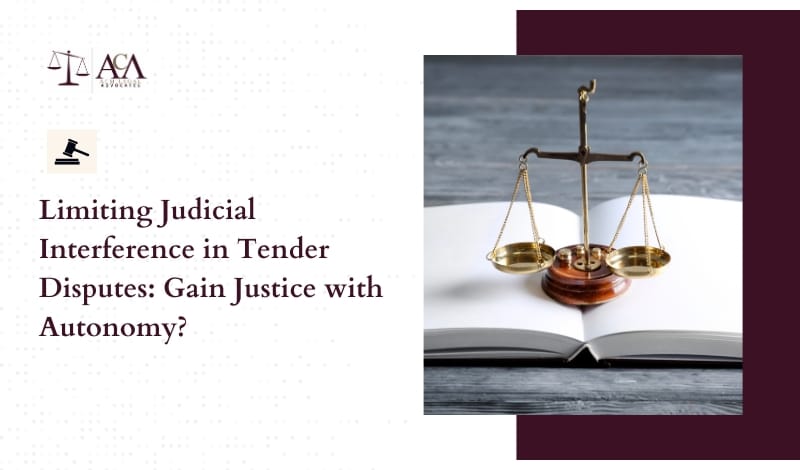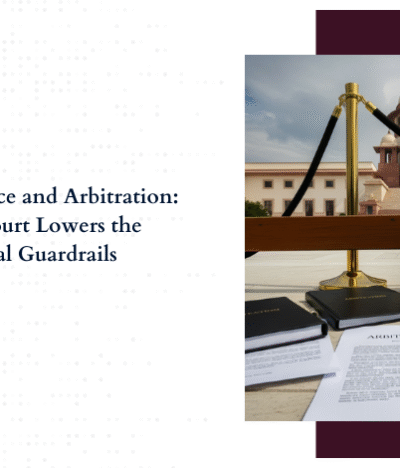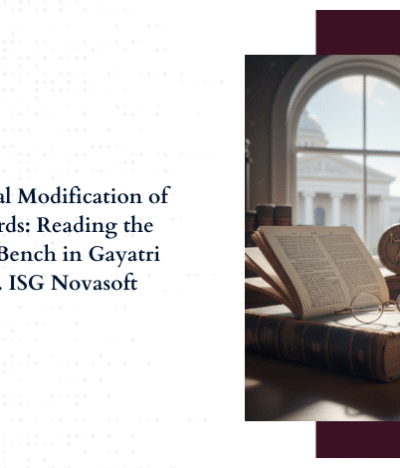Tendering processes are fundamental to public procurement and private contracting. They ensure transparency, competitiveness, and fairness in the awarding of contracts. However, disputes often arise, leading to judicial interference in tender disputes. The challenge lies in balancing the courts’ role in ensuring justice against the need to respect the autonomy of contracting parties and the efficacy of the tendering process.
Tender Disputes: Scope and Complexity
Tender disputes encompass a wide range of disagreements arising during the procurement process, from allegations of unfair treatment and bid manipulation to disagreements over contract interpretation and performance. These disputes can involve various stakeholders, including bidders, procuring entities, and regulatory bodies, making them inherently complex and challenging to resolve.
Principles of Tender Processes
Fairness, Transparency & Accountability are core principles that underpin the integrity and legitimacy of tender processes, ensuring that all bidders have an equal opportunity to compete and that the procurement process is conducted in a transparent and accountable manner.
Fairness entails treating all bidders equally, ensuring a level playing field and eliminating bias or favoritism. Transparency requires open and accessible information about the procurement process, allowing bidders to fully understand the requirements and procedures. Accountability ensures that all parties involved in the procurement process are held responsible for their actions and that any irregularities or breaches are investigated and addressed.
Principles for Limiting Judicial Interference in Tender Disputes
Judicial Restraint: Courts have recognized the importance of maintaining a hands-off approach to allow contracting authorities to exercise discretion in their decision-making processes. This restraint is crucial for fostering an environment conducive to competitive tendering.
Focus on Procedural Fairness: Judicial review is increasingly centered on procedural fairness rather than substantive outcomes. Courts will assess whether the process followed by the contracting authority complied with established legal norms and principles, rather than second-guessing the merits of the decision itself.
Encouraging Alternative Dispute Resolution: Many jurisdictions are promoting ADR mechanisms for resolving tender disputes, recognizing that they can offer quicker, more cost-effective solutions than litigation. Courts may encourage parties to pursue ADR before seeking judicial intervention.
Limiting judicial interference in tender disputes is a crucial aspect of ensuring fair and efficient procurement processes. To achieve this, many legal systems have established specific mechanisms to address tender-related conflicts without excessive intervention from the courts. One of the approaches is inclusion of dispute resolution clauses in tender documents that outline procedures for resolving disputes through negotiation, mediation, or arbitration. These alternative dispute resolution methods aim to streamline the resolution process, reduce costs, and promote faster outcomes compared to traditional court proceedings. Additionally, administrative bodies or specialized tribunals often have jurisdiction over tender disputes. By entrusting these specialized entities with resolving tender conflicts, it helps maintain consistency in decision-making, promotes expertise in the field, and reduces the burden on the regular court system. It further contributes to the development of a body of precedents and guidelines specific to tender disputes, enhancing predictability and coherence in the resolution of such conflicts.
By implementing effective dispute resolution mechanisms, utilizing specialized administrative bodies, and maintaining transparent tender processes, jurisdictions can effectively limit judicial interference in tender disputes. These measures not only contribute to the efficiency of procurement processes but also uphold the principles of fairness, transparency, and accountability in public procurement practices.
The Role of the Judiciary in Tender Disputes
The judiciary plays a crucial role in resolving tender disputes, providing a mechanism for resolving disagreements and ensuring the enforcement of the principles of fairness, transparency, and accountability. Courts have the power to review procurement decisions, ensuring that they comply with the applicable laws and regulations. Judicial intervention can be necessary to protect the rights of bidders and to ensure the integrity of the procurement process.
However, the judiciary’s role must be balanced against the need for efficiency and autonomy in the procurement process. Excessive judicial interference can lead to delays, increased costs, and uncertainties for all parties involved. Courts should not usually interfere in tender and contract matters, unless there are certain specific circumstances like public interest, Mala fide actions of tendering authority, misuse of statutory powers or gross negligence. The court should not examine tenders with a magnifying glass, make small mistakes appear like big blunders or to impose their decision on the employer regarding whether to accept a tenderer’s bid.
In M/s N.G. Project Ltd. v. M/S Vinod Kumar Jain & Ors., held that if the tendering process found to be arbitrary, the court should avoid granting an ad-interim injunction on the tendering authorities and the petitioner should be compensated for loss suffered. In Tata Cellular v. Union of India, the Supreme Court laid down principles pertaining to the scope of judicial review while dealing with administrative process during tendering. In Silppi Construction Contractors v. Union of India, it was held that court is duty bound to interfere when there is arbitrariness, irrationality, malice and bias and must also restrain while exercising judicial review in contractual matters.
Challenges of Excessive Judicial Interference in Tender Disputes
Excessive judicial interference in tender disputes can pose significant challenges to the efficient and effective operation of procurement processes. These challenges include:
- Delays in project implementation: Judicial intervention can significantly delay the procurement process, leading to project delays and increased costs.
- Uncertainty for bidders: Frequent legal challenges can create uncertainty for bidders, making it difficult to plan and invest in future projects.
- Increased litigation: Excessive judicial intervention can encourage a culture of litigation, leading to an increase in disputes and a strain on resources.
Balancing Judicial Autonomy and Tender Autonomy
The key to effective tender dispute resolution lies in striking a balance between judicial review and tender autonomy. This balance ensures that the judiciary plays its essential role in ensuring fairness and transparency while respecting the autonomy of contracting parties to make informed decisions. This balance can be achieved by establishing clear and concise guidelines for judicial intervention, limiting the scope of review, and promoting alternative dispute resolution mechanisms.
In addition, the judiciary should focus on providing clear and concise rulings that offer guidance for future tender processes. This can help to reduce uncertainty and minimize the likelihood of future disputes.
Conclusion
The evolving judicial landscape regarding tender disputes reflects a growing recognition of the need to limit interference in favour of promoting efficient and effective procurement processes. As demonstrated by recent case law, courts are increasingly inclined to uphold the autonomy of contracting authorities while ensuring that the principles of fairness and legality are maintained. This approach not only respects the integrity of the tendering process but also fosters a competitive environment that benefits both public and private sectors.
Expert Legal Solutions to Manage Judicial Interference in Tender Disputes – ACM Legal
ACM Legal offers expert legal guidance in navigating complex tender disputes, ensuring that your procurement processes adhere to principles of fairness, transparency, and accountability. With a deep understanding of judicial restraint and alternative dispute resolution mechanisms, our team is well-equipped to protect your interests while minimizing delays and litigation risks. Trust ACM Legal to safeguard your tendering process and help you achieve optimal results with minimal judicial interference.
FAQs on Judicial Interference in Tender Disputes
1. What is judicial interference in tender disputes?
Judicial interference in tender disputes refers to court involvement in the decision-making processes of tendering authorities, which can disrupt the procurement process and create delays.
2. Why is it important to limit judicial interference in tender disputes?
Limiting judicial interference in tender disputes helps maintain the integrity and efficiency of the procurement process, ensures timely project execution, and minimizes unnecessary legal costs.
3. What legal frameworks exist to limit judicial interference in tender disputes?
To limit judicial interference in tender disputes Various legal frameworks, such as procurement laws and guidelines, encourage administrative dispute resolution mechanisms, often requiring parties to exhaust these remedies before seeking judicial intervention.
4. What role do alternative dispute resolution (ADR) mechanisms play?
ADR mechanisms, such as mediation and arbitration, provide parties with a quicker and less formal means of resolving disputes, thereby reducing the need for court involvement.
5. Can a tendering authority refuse to accept a court’s intervention?
While a tendering authority cannot outright refuse court intervention, it can promote contractual clauses that require disputes to be settled through specified ADR methods before any court proceedings.
Author: Eccha Shukla
Co-Author: Divya Singh






